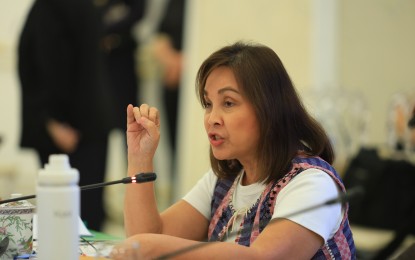
PUBLIC CONSULTATION. Senate President Pro Tempore Loren Legarda encourages the people of Baguio City to express their opinions on the Resolution of Both House No. 6 during the first public consultation outside Metro Manila on Friday (May 17, 2024). Legarda reiterated that RBH 6 would focus only on three issues – foreign ownership for public utilities, higher education and the advertising industries. (Photo courtesy of Senate PRIB)
MANILA – Congress still needs to craft specific measures that will open up the Philippine economy to foreign ownership even if Resolution of Both Houses (RBH) No. 6 will be approved by inserting the "unless otherwise provided by law" phrase in the proposed amendments of the 1987 Constitution, Senate President Pro Tempore Loren Legarda clarified on Friday.
Legarda made the clarification during the consultation of the Senate Subcommittee on RBH 6 held in Baguio City attended by local leaders and officials from Northern Luzon.
"Let me just state that if and when there’s an approval of the resolution of both Houses, it does not already open the economy in certain sectors because all we’re doing is, there’s a provision that says unless otherwise provided by law, meaning inaatas po sa lehislatura (the Legislature is mandated). We still have to enact the pieces of legislation that will lead to that 100 percent allowing, at least, 100 percent, ownership to foreigners, but (it) depends on (the) discussion of both Houses of Congress," Legarda explained.
After hearing a few suggestions to include political provisions in the amendments, Legarda reiterated that RBH 6 only intends to touch the three specific economic provisions of the 1987 Constitution which concern public services, higher education, and advertising industries.
"This will not touch, at least the Senate version, on any political changes, only economic and even in economic, only focusing on those three aspects and one was already enacted by both Houses of Congress," she said.
The senator was referring to Republic Act 11659, or the Public Service Act, that enables the liberalization of key public services by allowing full foreign ownership of businesses in select industries, such as airports, railways, expressways, and telecommunications.
Legarda noted that there are still certain sectors that are covered by the 60-40 ownership restriction -- which include power distribution and transmission, petroleum, pipeline transmission systems, seaports, public utility vehicles, and water pipeline distribution systems -- which will remain untouched even if the proposed amendments will be approved.
Senator Sonny Angara, who chairs the subcommittee, agreed with Legarda, saying that he sees the need for "some improvements in these sectors" which were mentioned under the Public Service Act.
"We can benefit from foreign technology, I think and kung magaling ang local industries (if the local industries will step up), they may even one day be the competitors of those industries. That's the model of Korea, Japan, Taiwan, among others," Angara said.
Next sessions
After Baguio City, the subcommittee will proceed to the cities of Cebu in the Visayas and Cagayan de Oro in Mindanao to conduct more consultations.
In a separate news release, Legarda underscored the importance of participation from all sectors for the Senate to stakeholders’ take on the provisions.
"You don’t have to agree because we really want to know the truth and the pulse of the people. If you agree, well and good. But if you don’t agree, we welcome that and we want to know why," Legarda said. "We may be wrong. We may be including the wrong industries or the wrong sectors. There may be sensitivities in certain regions where it need not be liberalized, the ownership of certain sectors."
Legarda also alleviated fear of backlash on those looking to voice out adverse opinions.
"The Regional Directors, we understand your position. You have to agree with Central Manila, even if deep in your heart, you may not agree," she said.
"So, for fear of perhaps losing your jobs or because you have to toe the line, so if there is anyone here, Integrated Bar of the Philippines, academic institutions, NGOs (non-governmental organizations) who may not agree because we authored this, 'di naman perpekto ‘to (this is not perfect), the process of legislation, it is far from perfect." (PNA)
 The Philippine News Agency is a web-based newswire service of the Philippine government under the supervision of the News and Information Bureau (NIB) of the Presidential Communications Office (PCO).
The Philippine News Agency is a web-based newswire service of the Philippine government under the supervision of the News and Information Bureau (NIB) of the Presidential Communications Office (PCO).